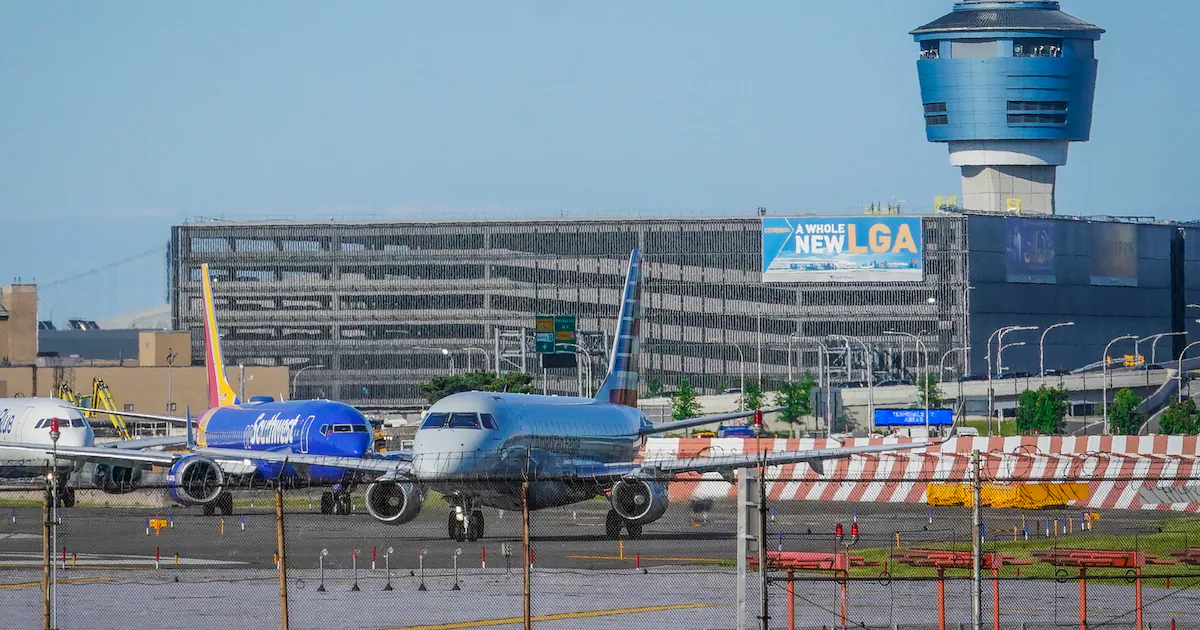
Last spring, Transportation Secretary Pete Buttigieg appeared at Reagan National Airport on a victory lap to tout two new customer-friendly rules that had just been finalized.
Passengers would no longer have to jump through hoops for cash refunds if their flight got canceled or services they paid for weren’t provided. They would be able to see bag fees up front as they shopped. And, Buttigieg said, families could look forward to a rule that would ban airlines from charging parents and kids to sit together.
“It represents the latest step – two steps in fact – in our ongoing journey … to deliver the biggest expansion of passenger rights in the department’s history,” he told a group of reporters.
Under President Joe Biden, the Department of Transportation launched investigations, carried out enforcement action against airlines, ushered rules through prolonged regulatory processes and welcomed the passage of a law that included some top priorities in the administration’s final months.
But under a new administration with a new secretary, momentum for passenger rights has stalled.
The future of the family seating rule is now unclear. In January, a group of airlines won a challenge in court that allowed them to keep showing fares without fees; the Transportation Department has since suggested it will “examine rescinding” that rule. Some automatic refunds may also be at risk as the department says it is planning changes “intended to reduce regulatory burdens on airlines.”
Those updates were part of an agenda the department released earlier this month, offering the first indication of its priorities when it comes to passenger protections. The preview signals a move away from a key focus of the Biden administration, and consumer advocates are alarmed.
“In our darkest nightmares, we did not expect that they would potentially strip out anything that was already law or part of DOT rules,” said Teresa Murray, consumer watchdog director for the Public Interest Research Group.
Under Biden “it was a sea change in how the Department of Transportation was really centering consumers and fliers and travelers and their wallet,” said Lindsay Owens, executive director of Groundwork Collaborative, an economic policy think tank. “This completely reverses that and there aren’t a lot of options.”
Earlier this month, the Transportation Department announced a decision not to move forward with a Biden administration proposal that would have mandated compensation, meals and lodging similar to what fliers in Europe enjoy when they encounter disruptions caused by airlines. Dozens of Democrats in Congress criticized that move in a letter last week.
“This decision undermines consumer protections and will only raise the cost of travel,” the letter says. “We urge the Department of Transportation to immediately reverse this decision and advance the proposed rule.”
The department, now led by Sean P. Duffy, did not respond to questions about specific rules or provide any officials to speak with The Washington Post about consumer priorities.
Instead, the department provided a statement that listed what it considered failures under Buttigieg, including failing to address dozens of close calls at Reagan National Airport and spending on diversity and climate change initiatives. The statement argued that the best way to address delays is to “fix our broken air traffic control system.”
“After four years of negligence, we are tackling the root cause of the problem rather than performatively claiming to address the symptoms for political points,” the statement says.
Some consumer protections, including prompt refunds for canceled or significantly changed flights, were included in a law Congress passed last year that funded the Federal Aviation Administration through 2028. Others came about as a result of a lengthy process that agencies use to create rules.
Because items specifically included in the FAA law are considered a mandate, they are seen as more protected than agency rules – which can be changed or removed by an administration with different priorities.
The Transportation Department said its commitment to carry out Congress-directed consumer protection mandates – including those in the FAA law – has not changed.
“These actions are part of our broader effort to ensure the traveling public is treated fairly while also recognizing how overly burdensome regulations will raise ticket prices for the traveling public and compromise safety for the sake of efficiency,” the statement from the Transportation Department says.
Airlines for America, an airline industry group, has urged the Trump administration to back off the regulations proposed under Biden. In May, the trade group submitted a lists of requests that included ending investigations started during Biden’s term; ditching a partnership with multiple state attorneys general to investigate airline misconduct; abandoning rules on fee transparency and mobility aid assistance; and pulling back refund rules it said exceeded the government’s authority.
“We are encouraged by this Department of Transportation reviewing unnecessary and burdensome regulations that exceed its authority and don’t solve issues important to our customers,” the group said in a statement. “We look forward to working with DOT on implementing President Trump’s deregulatory agenda.”
Here are some of the measures that the Transportation Department moved forward under Biden, and where they stand now.
Fee-free seating for families
Status: Unclear
Families have complained for years that some airlines do not guarantee that parents will be able to sit next to their young kids unless they pay an extra fee to choose their seats.
While most airlines say they will make an effort to seat kids next to adults, a DOT dashboard shows five major U.S. airlines that have committed to the practice and five that have not.
As part of the larger bill reauthorizing the Federal Aviation Administration last year, Congress directed the Transportation Secretary to propose a rule directing carriers to seat kids under 14 next to an adult in their party when possible at no additional cost.
The Transportation Department proposed the rule in August 2024, but the next steps are not clear.
“DOT is considering the potential next steps for this rulemaking,” according to a federal website, which notes that the next action is “undetermined.” Airlines for America supported what it called the “limited mandate” laid out by Congress, but took issue with what it saw as “superfluous overreach” in the rule that followed.
In 2023, then-Sen. JD Vance supported legislation that would ban airlines for charging parents to sit with their kids. Vance is now vice president.
“Airlines should never be allowed to force parents to choose between paying more and being separated from their kids,” he wrote in a letter with Sen. Edward J. Markey (D-Mass.). “In extreme circumstances, parents have found themselves assigned seats many rows away from their very young children – a serious safety risk for those kids and an injustice to those families. This practice must end.”
The Transportation Department did not respond to questions about the future of the rule. On a federal website, it is listed under “long-term actions.”
Automatic refunds for flights, bags and bad WiFi
Status: Vulnerable to rollbacks
The FAA reauthorization bill says airlines have to issue a cash refund for canceled or significantly changed flights if the traveler decides not to fly, gets rebooked or accepts a credit or voucher.
A Biden-era rule, which can be changed, defined what would count as a significant change to a flight. It also included the right to a refund for bag fees in the case of a significant delay and a refund for services such as WiFi or seat selection when airlines fail to provide them.
“The automatic refunds, I think, were a huge innovation in consumer protection and fairness,” said Owens, of Groundwork Collaborative. “If you pay for WiFi and then the WiFi doesn’t work … the $12 goes back on your credit card, you don’t have to get off the plane, find the email for customer service, find the screenshot of your ticket.”
But, she noted, that part of the rule wasn’t spelled out in the law that Congress passed, putting it at risk.
The department doesn’t say much about what it has in mind for the rule, other than a proposal meant “to reduce regulatory burdens on airlines and ticket agents.”
A potential new rule included on the department’s agenda for 2025 would address the definition of a refundable flight cancellation, the meaning of “timely bag delivery,” automatic refunds of fees for services that are not provided and obligations of airlines to travelers who are dealing with a serious communicable disease.
Disclosing fees up front
Status: Blocked in court
A rule that would have forced airlines to show extra fees alongside fares and schedules – making it easier for travelers to compare the cost of carry-on or checked bags when searching for a ticket – never went into effect after an 18-month process to become a final rule. Airlines for America and several carriers sued to stop enforcement last year, when Biden was still in office.
At the time, the Transportation Department said it would vigorously defend the measure meant to help consumers avoid surprise fees. Earlier this year, the appeals court sent the rule back to the department to address flaws that it found with the rule’s development.
President Donald Trump’s Transportation Department said in its list of priorities that it would “examine rescinding” the rule around fee disclosure.
William McGee, senior fellow for aviation and travel at the American Economic Liberties Project, said he questions whether people voted for such decisions, even if they cast a vote for Trump.
“Did anybody vote to say, ‘Well, when I’m shopping for an airfare, which is one of the most confusing products on the free market anyway, I don’t even need to know all the prices ahead of time?’”
European-style compensation for disruptions
Status: Rolled back
The Biden administration announced a proposal after the election, in December, that would have brought the U.S. in line with the European Union, Brazil and Canada by requiring airlines to compensate passengers for cancellations or significant delays caused by the carrier.
An eventual rule would have also forced airlines to cover meals, hotels and transportation expenses related to the disruption – which many have already pledged to do.
Airlines for America urged the government to abandon that proposal, which never moved beyond the pre-rule stage. The department said earlier this month that it would withdraw the proposal from consideration, “consistent with department and administration priorities.”
Advocates have said the proposed rule would have provided protections to travelers in the U.S. that people already experience around the world.
“The fact that it’s treated as such a pie-in-the-sky idea … speaks to how dysfunctional we are in this country in how we view consumer protections,” McGee said.



